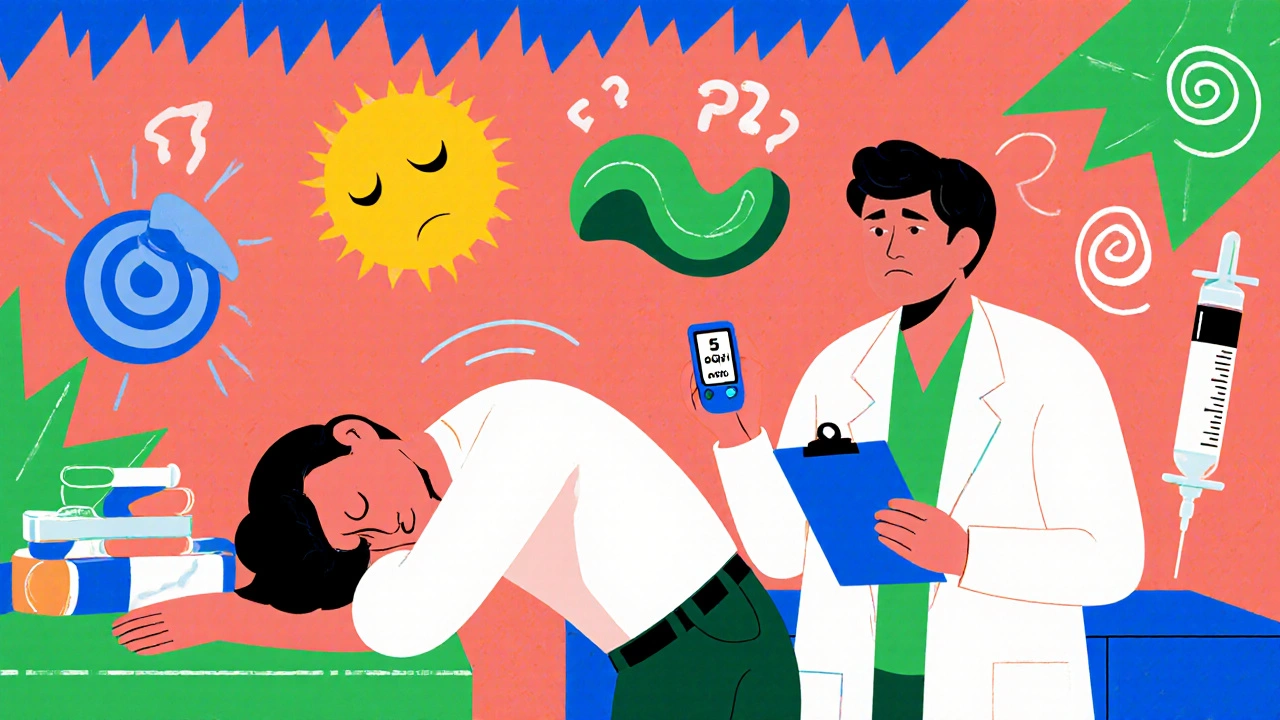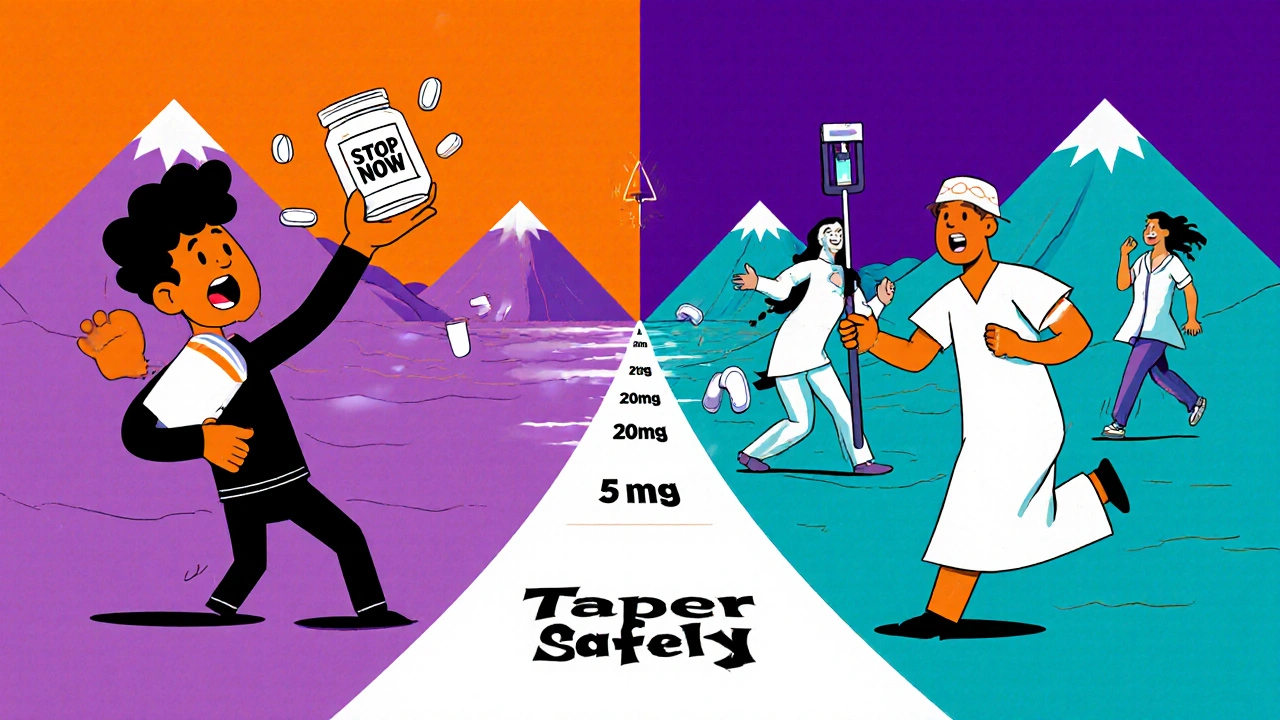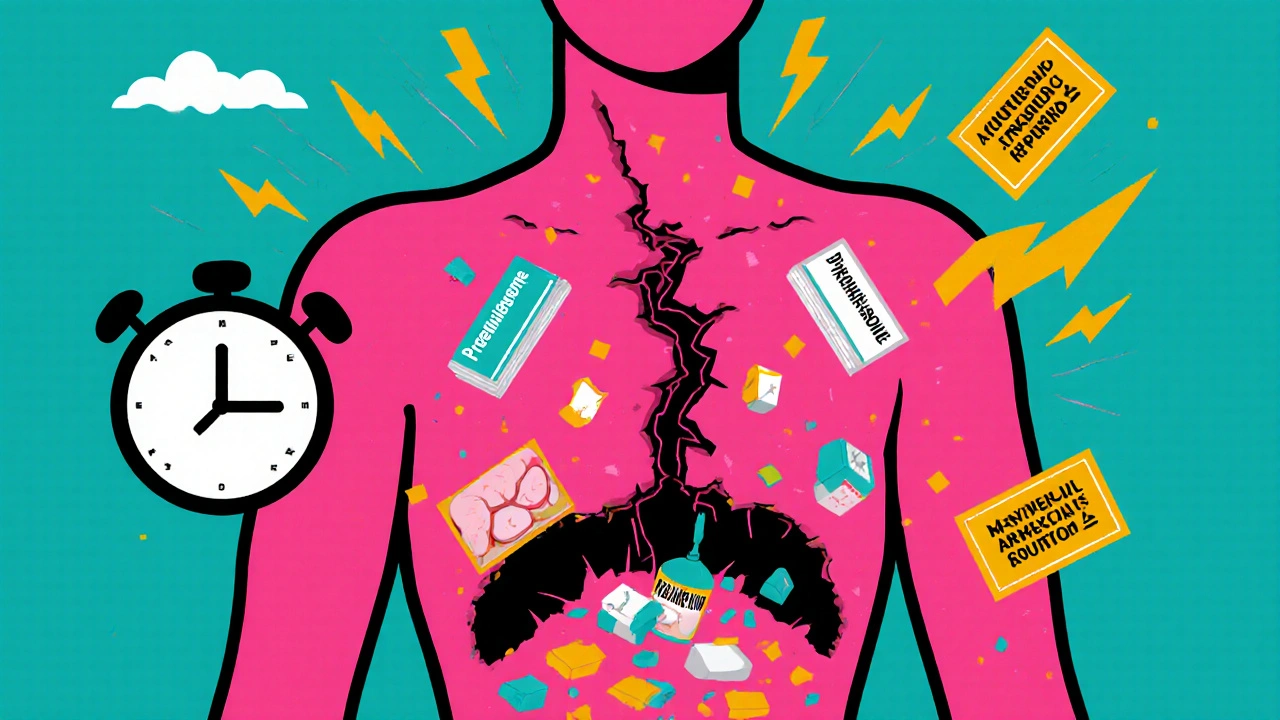Steroid Tapering Calculator
Calculate Your Safe Steroid Taper Schedule
Recommended Taper Schedule
Critical Safety Note
Stopping corticosteroids like prednisone or dexamethasone isn’t as simple as just skipping a pill. For many people, it’s a quiet medical time bomb. Adrenal insufficiency from corticosteroid withdrawal can sneak up after even a few weeks of use-and it can kill you if no one recognizes the signs.
What Happens When You Stop Steroids?
Your body doesn’t make cortisol on demand like a faucet. It’s a slow, controlled process. The hypothalamus sends a signal to the pituitary, which tells the adrenal glands: "Make cortisol." But when you take synthetic steroids for weeks or months, your body thinks it’s getting enough. So it shuts down its own production. The adrenal glands shrink. The signals fade. And when you suddenly stop the pills? Your body has nothing left to give. This isn’t rare. Around 1-3% of adults in the U.S. are on long-term steroids. That’s millions of people. And according to the National Institute of Diabetes and Digestive and Kidney Diseases (NIDDK), the most common cause of adrenal insufficiency overall? Stopping steroids too fast. Even low doses matter. You don’t need to be on 40 mg of prednisone for six months. A 2023 study in Endocrine Abstracts found that taking as little as 5 mg daily for under four weeks can suppress your adrenal glands. That’s a common prescription for allergies, asthma, or a flare-up of arthritis. People think they’re safe. They’re not.The Warning Signs You Can’t Ignore
Symptoms don’t show up right away. They creep in 24 to 72 hours after your last dose. At first, they look like the flu, or stress, or depression.- Severe fatigue that doesn’t improve with rest (reported in 85% of cases)
- Loss of appetite and unexplained weight loss (72%)
- Nausea, vomiting, stomach pain (68%)
- Muscle weakness so bad you can’t climb stairs (65%)
- Mood swings, irritability, or deep sadness (58%)
Adrenal Crisis: A Medical Emergency
An adrenal crisis isn’t a scare-it’s a death sentence without treatment. You’ll have severe vomiting, confusion, fainting, or even coma. Fever may spike. Blood pressure plummets. Shock sets in. A 2022 report from the Cleveland Clinic found that 6% of people who go into adrenal crisis die if they don’t get help fast. One case from Endocrine Abstracts tells the story: a 45-year-old woman stopped dexamethasone after a COVID infection. She went to the ER with nausea and fever. Doctors thought it was a UTI. She kept getting worse. Only when her blood pressure kept dropping did someone think: "Could this be adrenal insufficiency?" They gave her IV hydrocortisone. Within an hour, she sat up. Within 24 hours, she was discharged. That’s the difference between recognition and delay.Tertiary vs. Secondary: Why It Matters
Not all adrenal insufficiency is the same. There are three types:- Primary: The adrenal glands themselves are damaged (like in Addison’s disease).
- Secondary: The pituitary gland stops making ACTH.
- Tertiary: The hypothalamus stops making CRH-this is the one caused by steroid withdrawal.

How to Taper Safely-No One-Size-Fits-All
There’s no perfect taper. The European Society of Endocrinology says 4-8 weeks for most people. The Endocrine Society says: "It depends." Here’s what works in practice, based on the American College of Physicians’ 2024 toolkit:- If you were on more than 20 mg prednisone daily for over 3 weeks: don’t stop cold. Get tested first.
- For doses above 20 mg: reduce by 2.5-5 mg every 3-7 days.
- For doses between 5-20 mg: drop by 1-2.5 mg every 1-2 weeks.
- If you were on steroids longer than 6 months: go slower. Maybe 1 mg every 2 weeks.
What Patients Are Saying
On patient forums, the same stories keep coming up:- "My doctor said I was fine after 6 weeks on prednisone. I stopped. Two weeks later, I collapsed. I had no idea it could kill me."
- "I was told it was just post-viral fatigue. Took six weeks to get diagnosed."
- "Now I carry an emergency injection everywhere. My kids know what to do if I pass out."
What You Need to Do Right Now
If you’re on steroids-or just stopped them-here’s what you must do:- Never stop abruptly. Even if you feel fine. Even if your doctor says it’s okay.
- Know the symptoms. Fatigue, nausea, dizziness, weakness-not just "feeling off."
- Ask for a cortisol test. If you’ve been on more than 5 mg prednisone for over 4 weeks, request a morning cortisol and ACTH test before stopping.
- Get a medical alert bracelet. It should say: "Adrenal Insufficiency. Requires Cortisol in Emergency."
- Carry an emergency injection. Hydrocortisone injections are available by prescription. Learn how to use them. Teach someone you live with.

Why This Is Getting Worse
Steroid prescriptions have gone up 23% since 2015. More people are getting them for eczema, COPD, autoimmune conditions. But most doctors don’t talk about the risks. The FDA has required warning labels on all systemic steroids since 2021. The European Medicines Agency now requires patient alert cards in 28 countries. Yet, a 2023 JAMA study found 47% of patients don’t follow their tapering plan. Why? They’re scared of side effects. They think they’re fine. They don’t know what to watch for.The Future Is Better
New tools are coming. AI algorithms can now predict adrenal insufficiency risk with 92% accuracy by scanning your medical records for steroid use, lab trends, and symptoms. Point-of-care cortisol tests are in trials-results in 15 minutes, at the bedside. Genetic tests may soon tell us who recovers slowly after steroids. But none of that matters if you don’t know the signs.Final Thought
Steroids save lives. But they can also take them-if you don’t treat withdrawal with the same seriousness as the original condition. Adrenal insufficiency isn’t a footnote. It’s a silent killer hiding in plain sight. Recognize it. Prepare for it. Don’t wait for a crisis to learn how to save yourself.Can adrenal insufficiency happen after just a few weeks of steroids?
Yes. Even short-term use-like 4 weeks or less-can suppress your adrenal glands if you’re on doses as low as 5 mg of prednisone daily. The old belief that only long-term, high-dose use caused problems is outdated. A 2023 study confirmed that adrenal suppression can occur after brief exposure, making it critical to taper even short courses carefully.
What’s the difference between adrenal insufficiency and steroid withdrawal syndrome?
Steroid withdrawal syndrome includes symptoms like muscle aches, joint pain, fatigue, and mood changes that happen after stopping steroids-but your cortisol levels may still be normal. True adrenal insufficiency means your body can’t make enough cortisol, which causes low blood pressure, vomiting, and shock. The key difference? A blood test. If your morning cortisol is under 5 μg/dL and you have symptoms, it’s adrenal insufficiency-not just withdrawal. The two can overlap, but only one is life-threatening.
Do I need to carry an emergency injection if I’ve only taken steroids once?
If you’ve taken steroids for more than 4 weeks at any dose over 5 mg prednisone equivalent, yes. Even if it was years ago, your adrenal glands may still be slow to recover. If you ever need emergency surgery, suffer a serious injury, or get a severe infection, your body won’t be able to ramp up cortisol. Doctors will give you steroids then-but if you’re alone, you need to act fast. An emergency injection can buy you time until you get to a hospital.
Can a blood test confirm adrenal insufficiency after stopping steroids?
Yes, but timing matters. A simple morning cortisol test is a good first step. If it’s below 5 μg/dL, adrenal insufficiency is likely. The gold standard is the ACTH stimulation test: you get a shot of synthetic ACTH, then your cortisol is measured 30 and 60 minutes later. If your cortisol doesn’t rise above 18-20 μg/dL, your adrenals aren’t responding. But if you test too soon after stopping steroids-within 24-48 hours-you might get a false negative. Wait at least 72 hours for accurate results.
What should I do if I think I’m having an adrenal crisis?
Act immediately. If you’re dizzy, vomiting, confused, or have low blood pressure, give yourself an emergency hydrocortisone injection (usually 100 mg IM or IV if you’re trained). Call 911 or go to the ER right away. Do not wait. Do not try to "rest it off." Adrenal crisis can kill in hours. In the hospital, you’ll get IV fluids and continuous hydrocortisone. Recovery is fast-often within an hour-if treated early.
Is it safe to stop steroids if I feel fine?
No. Feeling fine doesn’t mean your adrenal glands are working. Cortisol levels drop silently. You can feel normal one day and collapse the next. Always taper under medical supervision. If your doctor says you can stop cold, ask for a cortisol test first. If they refuse, get a second opinion. Your adrenal glands can’t be trusted to wake up on their own after long-term steroid use.


9 Comments
Srikanth BH
November 26, 2025 AT 07:37Just wanted to say thank you for this post. I was on prednisone for 6 weeks for a bad flare-up and my doctor said I could stop cold. Two days later, I couldn't get out of bed. I thought I was dying. Took three ER visits before someone connected the dots. This info could save lives. Please share it with everyone you know.
Jennifer Griffith
November 27, 2025 AT 18:16lol so now i gotta carry a shot in my purse? next they’ll make us wear a tinfoil hat to block the cortisol demons. my doc said i’m fine, so i’m fine. stop scaremongering.
Roscoe Howard
November 27, 2025 AT 20:23It is both alarming and deeply concerning that such a fundamental physiological mechanism-namely, the hypothalamic-pituitary-adrenal axis-is so routinely disregarded in primary care settings. The erosion of clinical diligence regarding glucocorticoid withdrawal represents not merely a lapse in medical protocol, but a systemic failure of physician education. The data cited here are unequivocal, yet the prevalence of dismissive attitudes among clinicians remains staggeringly high. This is not anecdotal; it is epidemiological.
Patricia McElhinney
November 29, 2025 AT 15:47Ugh. Another one of these "steroids are secretly deadly" posts. I’ve been on 10mg for 8 months and I feel great. My doctor is a top-tier endo at Mayo. If he says I’m fine, I’m fine. You people need to stop reading Reddit and actually trust professionals. Also, you spelled cortisol wrong in the title. It’s C-O-R-T-I-S-O-L. Not C-O-R-T-I-S-O-L. Wait, no, you got it right. Never mind.
Agastya Shukla
November 29, 2025 AT 17:04From a clinical endocrinology perspective, the tertiary adrenal insufficiency model is particularly nuanced. The suppression of CRH is not merely a downregulation-it’s a neuroendocrine rewiring. The 72-hour window for cortisol testing is critical because of the half-life of exogenous steroids and the lag in hypothalamic reactivation. The ACTH stimulation test remains the gold standard, but its sensitivity plummets if performed before day 3 post-withdrawal. I’ve seen false negatives in patients who later presented in crisis. This is why we now recommend baseline cortisol + ACTH pre-taper in any patient with >4 weeks of exposure, regardless of dose.
Pallab Dasgupta
December 1, 2025 AT 08:10Bro. I stopped my 5mg prednisone after 3 weeks for my eczema. Felt fine. Then I tried to go hiking. Walked 200 feet. Collapsed. Sat on a rock. Cried. Thought I was having a heart attack. Turned out to be my body screaming for cortisol. Now I carry the shot. My wife knows how to use it. I even got a bracelet. I’m alive because I didn’t ignore the signs. If you’re on steroids-even a little-DON’T BE THAT GUY. TAPER. ASK. BE PREPARED. You’re not being dramatic. Your adrenal glands are literally begging you.
Ellen Sales
December 2, 2025 AT 04:45It’s strange… how we treat chronic pain with opioids for years, and no one bats an eye… but tell someone to taper steroids slowly, and suddenly it’s a conspiracy? The body isn’t a machine you can just flip off. It’s a living, breathing, hormonal symphony… and when you silence one instrument… the whole thing falls apart… quietly… slowly… until it’s too late…
Emily Craig
December 2, 2025 AT 21:44Oh wow, so now I need to carry a syringe like I’m in a zombie movie? I’m sure my doctor who gave me the script is just trying to kill me. /s. Honestly though-my aunt died from this. No one knew. She just got "really tired" after her knee surgery. They thought it was depression. She never woke up. So yeah. Maybe I’ll get the shot. And the bracelet. And make my kids watch a YouTube video. Just in case.
Karen Willie
December 3, 2025 AT 09:20This is one of those posts that makes me feel hopeful. People are finally talking about this. I’ve been a nurse for 18 years and I’ve seen too many patients get dismissed. If you’re reading this and you’re on steroids-even if it’s just for allergies-please, please, please ask your doctor about adrenal suppression. Don’t wait until you’re on the floor. You’re not being paranoid. You’re being smart. And you deserve to be heard.